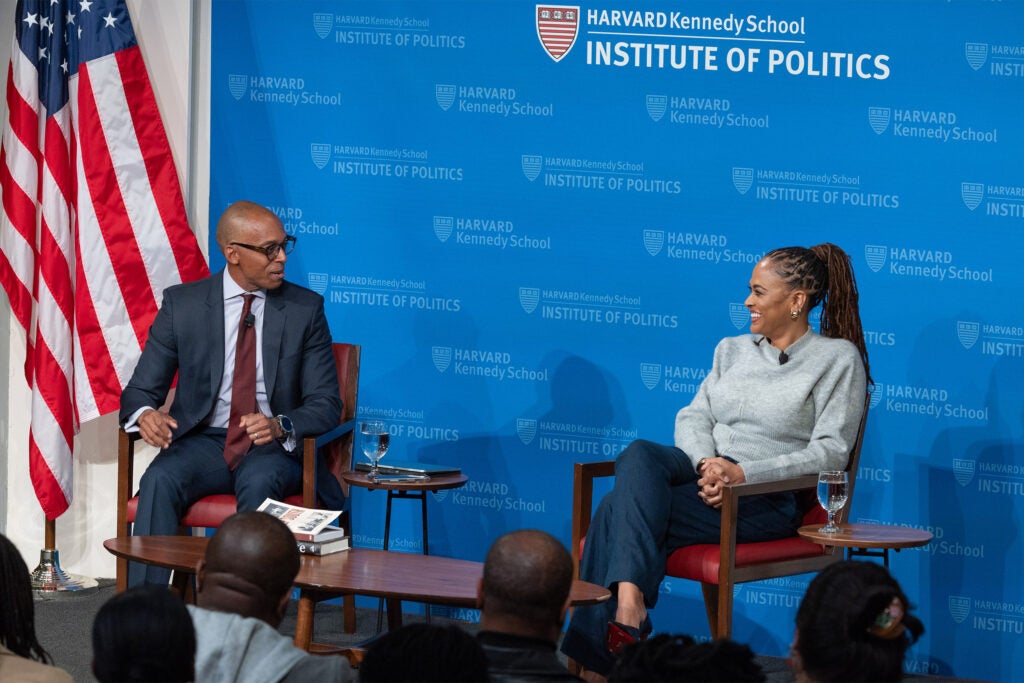In a talk at the Kennedy School Wednesday, award-winning filmmaker and screenwriter Ava DuVernay said the impetus for her latest film, “Origin” — an adaptation of Isabel Wilkerson’s nonfiction book “Caste: The Origins of Our Discontents” — wasn’t racism, antisemitism, or caste.
“I have to be motivated by human emotions,” said the “Selma” and “13th” director, explaining her decision to make the Pulitzer Prize-winning Wilkerson the protagonist of the film.
“I went in thinking, ‘I’m going to write a story about a woman writing a book,’” DuVernay said. Centering Wilkerson allowed her to explore “the interiority of the character. To write a movie about a woman on a journey.”
In “Caste,” Wilkerson explores underlying systems of social hierarchy, exploring connections between American racism, the persecution of Jews in Nazi Germany, and the subjugation of Dalits in India.
DuVernay said that after a second reading, she realized that Wilkerson was an obvious protagonist. This was partly because the author had shared on social media about the recent deaths of her parents and her husband.
“I don’t see my work as being about trauma. I see all my work as being about triumph, and you cannot triumph if you do not know what you are overcoming.”
Ava DuVernay
“I realized those losses happened when she was writing ‘Caste,’” DuVernay recalled. “She’s traveling the world. Her losses — and what she’s finding and gaining — all of those collide and all of those make their way into the book somehow.”
In some ways, DuVernay said, Wilkerson’s journey paralleled her own. In 2020, when “Caste” came out, DuVernay had recently lost a close family member. In addition, due to the pandemic, she recalled “everyone [feeling] afraid.” Soon after, the murder of George Floyd added to the “heightened emotions” of the day.

Wilkerson’s personal story “ignited” the historical information for DuVernay. “Origin” juxtaposes the contemporary story of Wilkerson and her book’s historical material, which “spans 400 years and seven different time periods.”
DuVernay said depicting the experience of the Dalits, the caste in India relegated to the lowest and most degrading work, was uncomfortable. She felt that as a non-Dalit, “I shouldn’t be doing it.” While she felt obligated to include such a major part of the book in her film, the experiences didn’t feel like hers to tell. In fact, for the filmmaker, it harkened back to another era — and another kind of injustice. “I likened it to well-meaning white people depicting African American life when Black people were not allowed to make films or given access to filmmaking,” she said. Without representation in the process, she concluded, “there’s usually a little something missing.”
DuVernay was joined on stage for the talk by Khalil Gibran Muhammad, Ford Foundation Professor of History, Race, and Public Policy at the Kennedy School.
“You’ve been making films about systemic racism for a long time, so what convinced you in the story of ‘Caste’ that Isabel Wilkerson had gotten it right?” asked Muhammad. “That somehow our language wasn’t quite right to capture … And I have a line here from the film, ‘Racism as the primary language to describe everything is insufficient.’ So talk us through your adaptation of this thesis.”
“I don’t say that she got it right,” DuVernay responded. “I think that her pursuit of her idea is fascinating.”
Describing the two years she spent interviewing Wilkerson, DuVernay explained her nuanced take.
“There are commonalities and there is an entry point that is shared across oppressions,” she said. “We don’t have to compete in the ‘oppression Olympics’ to see who is suffering more. This very simple idea of hierarchy of human beings based on a random set of traits is at the core of all of the -isms,” she concluded, naming racism and antisemitism along with Islamophobia and homophobia.
Despite the horrors in “Origin,” DuVernay said she sees her film as “a collection of love stories.”
“I don’t see my work as being about trauma. I see all my work as being about triumph, and you cannot triumph if you do not know what you are overcoming.”
Source link

